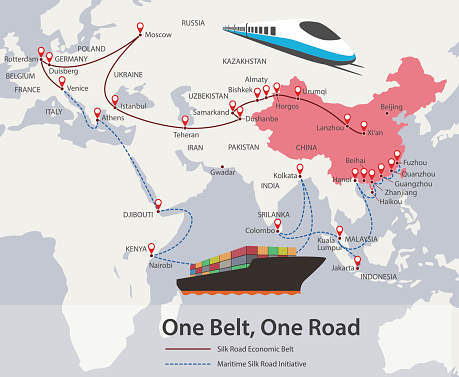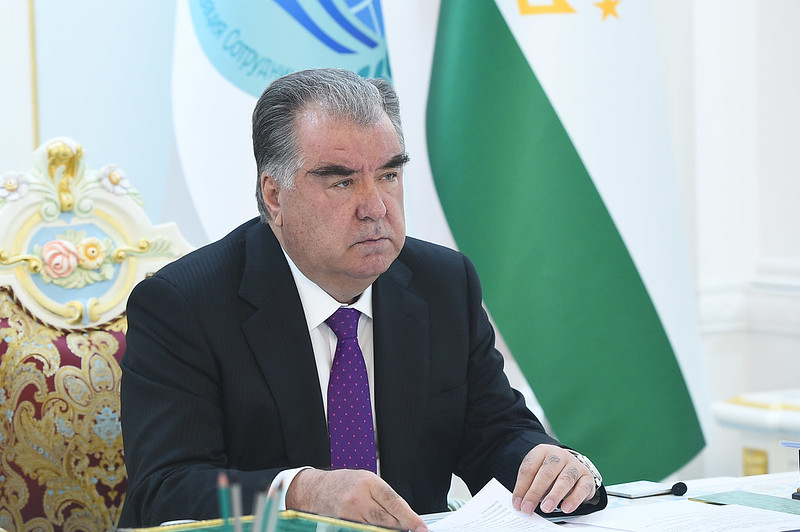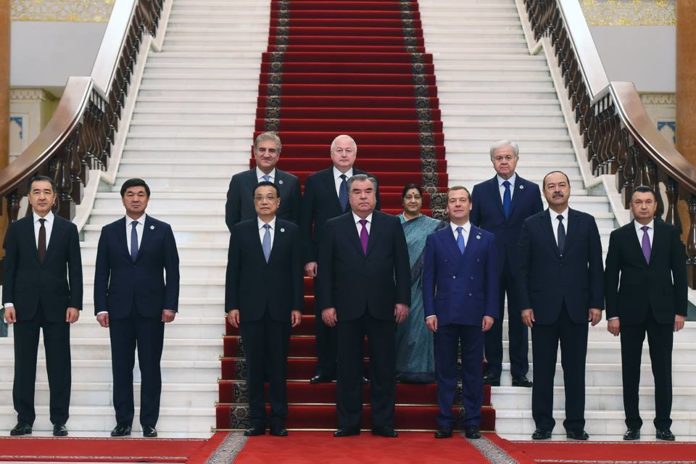The economics of Shanghai Cooperation Organization (SCO) is versatile, dynamic, diversified and huge in terms of collective GDPs, GNPs, population and above all human capitals. It consists of eight countries China, India, Kazakhstan, Kyrgyzstan, Pakistan, Russia, Tajikistan, and Uzbekistan. There are four observer states and six dialogue partners. The SCO member states covered nearly half of the world’s population and more than 60 percent of the Eurasian landmass, and their combined GDP accounts for more than 20 percent of the global total.
Aims of SCO
The main aims of SCO are to fight terrorism, separatism and extremism, engage in energy partnerships; engage in economic, scientific, and cultural partnerships and foster stability and safety. Most recently Tajikistan held the 17th meeting of the SCO Council of Heads of Government in its Dushanbe with a pledge to protect multilateralism and free trade. It was presided by Tajik PM H.E. Qohir Rasoulzoda.
Joint Declaration
The joint declaration showed strong political commitment of all the members states to consolidate multilateral trade system and fight against unilateralism and trade protectionism in any form. All states also stressed the need of greater trade facilitation and investment. During his speech Chinese Premier Li Keqiang called on SCO countries to conduct feasibility studies for the establishment of an SCO free trade area, and the development of institutional arrangements for closer regional economic cooperation.
SCO & World Economy
The joint declaration showed great concern and displeasure about the situation in the fragile world economy, incidents of anti-globalization, rise to protectionism, and continuing decline in the pace of development, volatility of financial markets, as well as other challenges in international trade. Moreover, international terrorism, the aggravation of conflict situations in a number of regions, as well as epidemics, climate change, and natural disasters were also tagged as serious threats to development and global economy.
SCO Development Strategy
The Heads of delegation also upheld their continued commitment to achieve the goals and objectives enshrined in the SCO Charter, the further implementation of the SCO Development Strategy until 2025 in order to deepen and expand cooperation in the field of politics, security and trade, promoting the construction of a new type of international relations based on mutual respect, justice, equality and mutually beneficial cooperation, as well as the formation of a common vision of the idea of creating a community of a common destiny of mankind.
Enhanced Economic Cooperation
They all Stressed the need for the SCO to adopt joint effective measures in the field of economic cooperation, which is an important part of ensuring socio-economic development and stability in the SCO space.
Enhanced Trade & Commerce Cooperation
They advocated facilitating the creation of an enabling environment for trade and investment with a view to the progressive realization of the free movement of goods, capital, services and technology, as envisaged by the SCO Charter.
SCO & WTO
The Heads of delegation ensured the implementation of the Joint Statement of the heads of SCO Member States on trade facilitation (Qingdao, 10 June 2018), continuing to discuss approaches to solving the problem of trade facilitation in the region, taking into account the importance of joining efforts in supporting and strengthening the multilateral trading system, based on the norms and principles of the WTO.
Importance of E-Commerce
The joint declaration recognized the important role of E commerce in promoting economic and trade growth, as well as in improving industrial sectors. They showed their willingness to deepen exchanges and cooperation in this area.

SCO & Belt and Road Initiative (BRI)
The Heads of delegation showed their full support for the Belt and Road Initiative (BRI) of the People’s Republic of China. Moreover, by highlighting the strategic importance of the BRI and its associated immense socio-economic dividends, the Heads of the delegation of the Republic of Kazakhstan, the Kyrgyz Republic, the Islamic Republic of Pakistan, the Russian Federation, the Republic of Tajikistan and the Republic of Uzbekistan, noted the efforts taken towards its joint implementation, including efforts to inter-link project of the Eurasian Economic Union and the BRI and advocated the use of the potential of the countries of the region, international organizations and multilateral associations to create a broad open, mutually beneficial and equal partnership in the sea space.
Single Effective Transit System
They all believed that the development of a single effective transit system, including electronic document flow, guarantee mechanisms and the ability to monitor the movement of goods, can play a contributory role in the further development and rigorous implementation of the BRI.
Central Asia & International Transport Corridors
The Heads of delegation welcomed the results of the international Conference “Central Asia in the system of international transport corridors: strategic prospects and unrealized opportunities” (Tashkent, 20-21 September 2018) as an important contribution to promote multilateral dialogue on the formation and development of trans port corridors in the SCO Region.
Construction of Energy Infrastructure
They underlined the importance of existing and under construction energy infrastructure facilities in the region, including hydropower facilities to achieve sustainable development goals, and expressed their readiness to increase cooperation in this area.
Financial Integration
The joint declaration appreciated the significant role of SCO Business Council and SCO Interbank Consortium in the interaction of business and financial circles of the SCO Member States for the development of business, trade and investment cooperation in the sea space, including by attracting the potential of Observer States and Dialog Partners. Furthermore, the Head of delegation gave a positive assessment to the accession of “Habib Bank Ltd.” of Pakistan to the SCO Interbank Consortium and continuation of the process of increasing number of the participants of the Consortium.
Agricultural Cooperation
The Heads of delegations supported further active cooperation in the field of agriculture, in such areas as processing and trade of agricultural products, scientific research in the field of agriculture, implementation of joint projects in various areas of the agricultural sector.
Silk Road University of Tourism Samarkand
They also welcomed the establishment of the Silk Road University of Tourism in Samarkand and called for the establishment of cooperation between the University and interested higher education institutions as well s relevant structures of the SCO member States. The next meeting of government will be held in 2019 in Uzbekistan.
Condemnation of Trade Protectionism
During the meeting, many leaders, including Russia’s Prime Minister Dmitry Medvedev, strongly condemned the trade protectionism. unilateral sanctions, and political blackmailing being done by certain countries. China’s Premier Li Keqiang called on SCO countries to conduct feasibility studies for the establishment of an sea free trade area, and the development of institutional arrangements for closer regional economic cooperation. The Joint Declaration reflected the SCO’s growing role in the fight against trade protectionism and the defense of multilateralism.
Tajikistan’s Role Contributory Role in SCO
Tajikistan being an active member of the sea shared a great deal of political trust and regarded economic development and the improvement of people’s livelihood as priorities, and it has a strong desire to cooperate with all the SCO member states. It is a staunch supporter of free trade and region al cooperation under the umbrella of the SCO.
Tajikistan shares close trading relationship with SCO states, especially China, Russia, Uzbekistan, Turkmenistan and Kazakhstan. Tajikistan stands for mutual trade and investment which should be expanded in scale and enlarged in scope, it has potential for even greater regional cooperation. Moreover, being a member of World Trade Organization (WTO) Tajikistan shares similar trading rules which provide it with much of the common ground to be needed to develop a multilateral trading system.
Tajikistan’s Supportive Role
Tajikistan believes in bilateral or multilateral regional economic and trade cooperation mechanisms established among SCO member states that has laid a foundation for them to explore the potential of an SCO free trade zone. It acknowledges supportive role the SCO summit in the further socio-economic integration of the Eurasian Economic Union and development of the Silk Road Economic Belt which would open up new prospects for regional economic cooperation, including a free trade zone.

Tajikistan: Champion of Regionalism & Greater Socio Economic Integration
The 17th SCO meeting in Tajikistan opened a new chapter of regionalism, greater socio-economic integration, regional connectivity and sense of security owing to which it appears that the global order is sliding from West to East. It has become a pioneer in the rise of non-Western arenas for global governance, and even a new paradigm of international relations. It is working for reconfiguration of the geopolitical and scape and a shift toward a multi polar world. The joint declaration is a comprehensive mix of shared positions: mutual cooperation, peaceful settlement of disputes and anti-terrorism.
Pakistan’s Foreign Minister
From Pakistan, its Foreign Minister Shah Mehmood Qureshi participated in the 17th SCO meeting in Tajikistan. During his speech he expressed readiness to work with regional countries under the umbrella of SCO to eliminate the threat of terrorism.
Important Activities
The meeting resulted in signing twelve documents, including 10 decisions of the Council and two interagency cooperation documents. Council members signed the SCO Secretariat report on the progress of implementation of the program of trade and economic cooperation between the SCO member nations, financial report on implementation of the SCO budget for 2018 and endorsed the Organization’s budget for 2018.
Heads of relevant ministries and agencies of the SCO member nations signed the program of cooperation on food security and the authorized agencies of the SCO member nations signed a memorandum on technical cooperation in jointly preventing and combating cross-border epizootic diseases.
Tajikistan’s Macro Economy 2018 & Beyond
According to the agency for statics under the President of Tajikistan its GDP for (January September 2018) has surpassed 47.5 billion somoni (more than $ 5 billion), which is 7 percent more than in the same period last year. Agriculture holds the first position in the structure of GDP 18.6 percent. Industry, including energy, accounts for 17.2 percent of GDP produced in the first nine months of 2018. Moreover, Trade, car repairs, hotels and restaurants occupy 14.9 percent of GDP, transport, communications and warehousing 11.6 percent and taxes 11.3 percent. Last year, the GDP growth of the Tajik economy was 7.1 percent. This year, the government expects growth of 7 percent. IMF, ADB and the Eurasian Development Bank forecast Tajikistan will maintain a high level of economic activity until the end of the year. They all believe that the growth of 7.1 percent is expected in the republic.
Smart Tajikistan
The government of Tajikistan intends to turn agrarian Tajikistan into a developed industrial state. For this, it is planned to increase industrial and energy capacities, reducing the dependence of the country’s economy on agriculture and platform of the SCO would provide it befitting propositions to achieve the desired goals of socio-economic prosperity and sustainable growth in the days to come.




